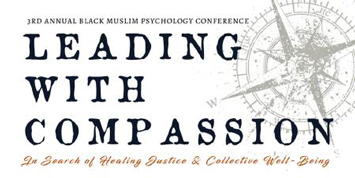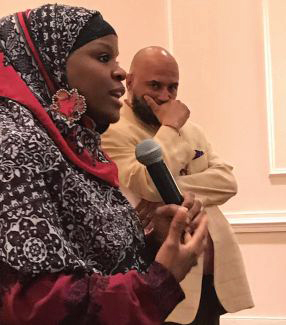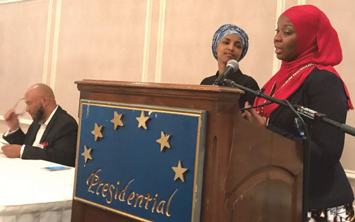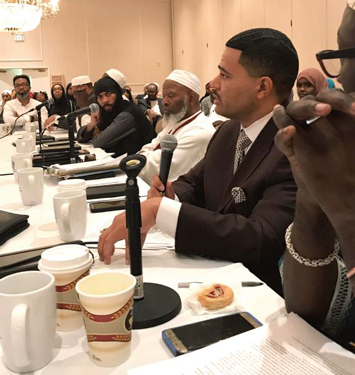Imam roundtable highlights Black Muslim Psychology Conference
By Jehron Muhammad -Contributing Writer- | Last updated: Aug 3, 2017 - 9:45:36 AMWhat's your opinion on this article?

Imams and ministers at the Black Muslim Psychology Conference 2017. Photos: Jehron Muhammad
|
PHILADELPHIA—Malcolm X said in 1964 that the problems facing Black people are “bigger than all other personal or organizational differences.” He went on to encourage Blacks to stop worrying about threats they think they pose to each other and concentrate on united efforts toward solving their unending hurt.

|
“We as Black Muslims, we are a family,” said Donna Auston, Ph.D. candidate in anthropology and one of the organizers of the conference. “As family you know there is a lot of love, but sometimes there is a lot of difficulty, challenges or disagreements. It was beautiful to see that we were able to come together as a family and say and handle this business this weekend,” she said.
According to organizers, the aim of the conference was to “gather grassroots activists, youth leaders, community organizers, community members, religious scholars and multidisciplinary experts in conversation about the role of leaders (formal and informal) in facilitating community healing and addressing issues related to race, gender, faith, power, privilege and emotional well-being.”

Activist, educator & Islamic scholar Ieasha Prime.
|
The conference also reflected the diversity of the Black Muslim experience in America and included Black Americans as well as Muslims from Somalia, West Africa the Caribbean and Canada that participated. There were also representatives from various schools of Islamic thought, including Sunni, Salafi , Shia, Sufi and the Nation of Islam.
The framework for the day’s proceedings was set daily by prominent speakers, including activist and Minnesota State Representative Ilhan Omar from Somalia and activist, public speaker, educator, Islamic scholar Ieasha Prime.
Rep. Omar expressed the importance of the Black Muslim population having “honest conversations rooted in community and healing.” She said in the Somali community there is not much consideration for mental wellness. She said, “We know these issues are pervasive among Muslims, people of color and other marginalized communities,” and thanked the Muslim We l l n e s s Foundation for taking on such an important task. “More than ever we need honest conversations rooted in community and healing,” said Rep. Omar.
On Saturday, Ms. Prime set the stage for the highly anticipated Imam Roundtable. She stressed the importance of holding the imams in high regard and not making them feel that “we’re trying to replace you.” We need you and we actually want to work with you, she added.

Ph.D. candidate and co-convener of the Black Muslim Psychology conference Kameelah Rashad introducing Minnesota State Rep. from Somalia Ilhan Omar.
|
Identifying some of the issues that have historically plagued Muslims, people of color and other marginalized communities, Ms. Prime said, “Many times we even defined our communities based on the experiences of slavery and colonialism. We are acting as a result of the trauma that occurred to us, not inside our original nature.”
She went on to explain that the blessings for imams is in shepherding over the Jaamat (congregation) with an open mind, not one plagued by a “colonized mind.”

Student Minister Demetric Muhammad of Memphis speaks as Imam Siraj Wahaj of Brooklyn looks on.
|
“You got to sift through that knowledge and get that straight. Don’t come to me with the colonized mind and think I’m going to stay,” she pointed out.
Various Islamic schools of thought were also represented during the historic Imam Roundtable which included 30 imams and ministers from across the U.S. Two simultaneously held roundtable discussions included 15 religious leaders. Each were faced with the task of reflecting on “some of the most difficult or challenging aspects of their role as an imam.”
The spiritual depth of the roundtable discussion wasn’t just in the answers the imams gave, but in the questions and comments from Muslimahs (Muslim females) participating in the discussion. Qasim Rashad, the Emir of Philadelphia’s United Muslim Masjid, who co-chaired the conference, along with his wife Kameelah, moderated one of the simultaneous roundtables with Ms. Auston. Imam Rashad gave special mention to Nation of Islam Student Ministers Carlos Muhammad, of Muhammad Mosque No. 6 in Baltimore and Demetric Muhammad, author and member of the NOI Research Group.
Imam Rashad said of Student Min. Demetric that he presented a fresh perspective to the imams in his response to a spirited dialogue about Muslim women’s roles and functions within mosques and their role in leadership.
“There has to be female leadership in every Masjid,” commented Student Min. Demetric Muhammad. He shared examples of the structure within each NOI mosque, that includes a “Sister Captain” who is responsible for teaching and training the women and girls of the mosque. He also noted that there are other positions within the mosque structure that have been held by women.
Ph.D. candidate and president of the Muslim Wellness Foundation Kameelah Rashad, who with her husband co-chaired the conference, expressed appreciation to all those that helped in making the this year’s gathering a success story.
She wrote on her FaceBook page, that the effort was a “huge undertaking and financially risky for my small non-profit organization. But we said ‘Bismillah’ and forged ahead. It was the beautiful, smiling, happy faces of everyone who walked through the doors of The Presidential which kept me awake and energized.”
Ms. Rashad commended the “incredible genius of all the speakers” and gave a special thank you to the participating imams, who she called, “brave men … taking a risk and trusting the process and vision; nothing like this had ever been done before.”
INSIDE STORIES AND REVIEWS
-
-
About Harriett ... and the Negro Hollywood Road Show
By Rabiah Muhammad, Guest Columnist » Full Story -
Skepticism greets Jay-Z, NFL talk of inspiring change
By Bryan 18X Crawford and Richard B. Muhammad The Final Call Newspaper @TheFinalCall » Full Story -
The painful problem of Black girls and suicide
By Charlene Muhammad -National Correspondent- » Full Story -
Exploitation of Innocence - Report: Perceptions, policies hurting Black girls
By Charlene Muhammad -National Correspondent- » Full Story -
Big Ballin: Big ideas fuel a father’s Big Baller Brand and brash business sense
By Bryan Crawford -Contributing Writer- » Full Story






 Click Here Stay Connected!
Click Here Stay Connected!








